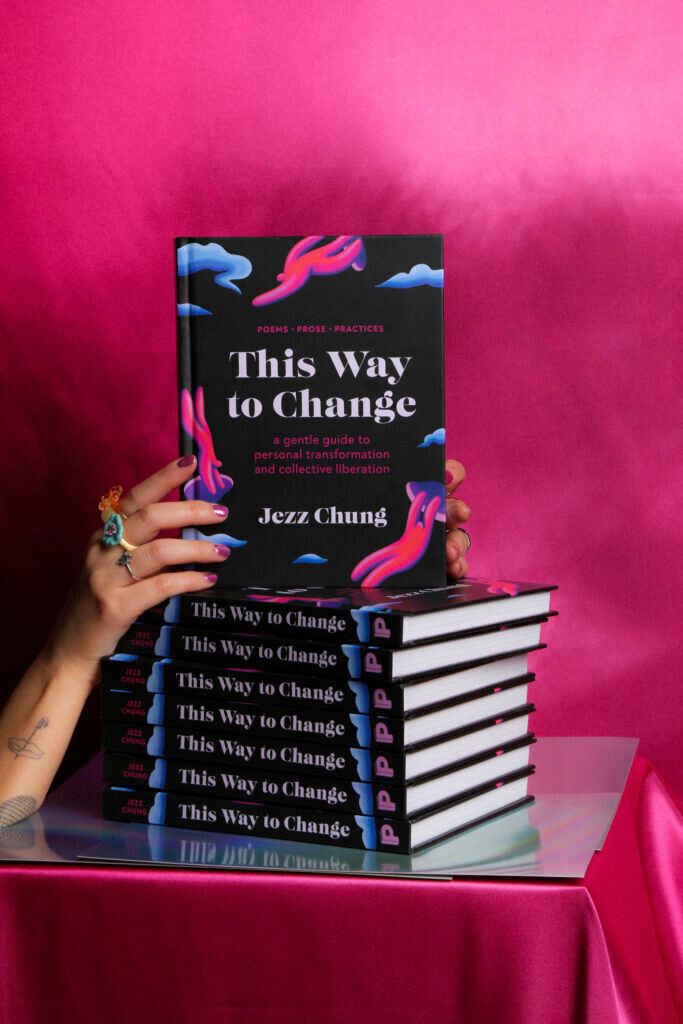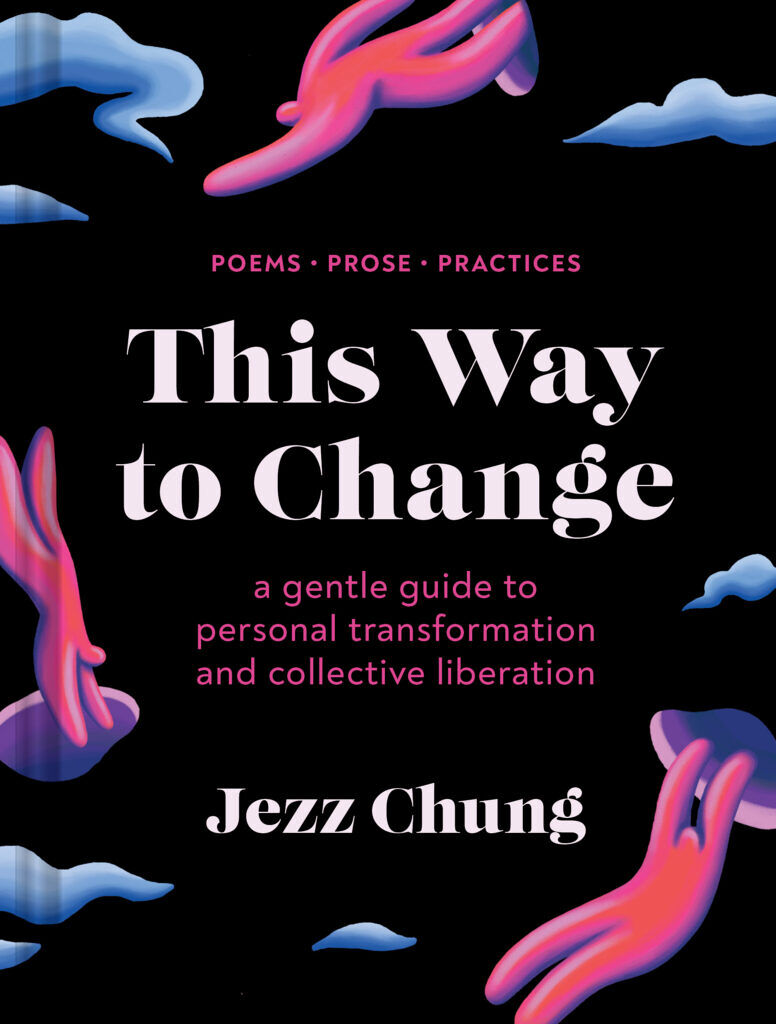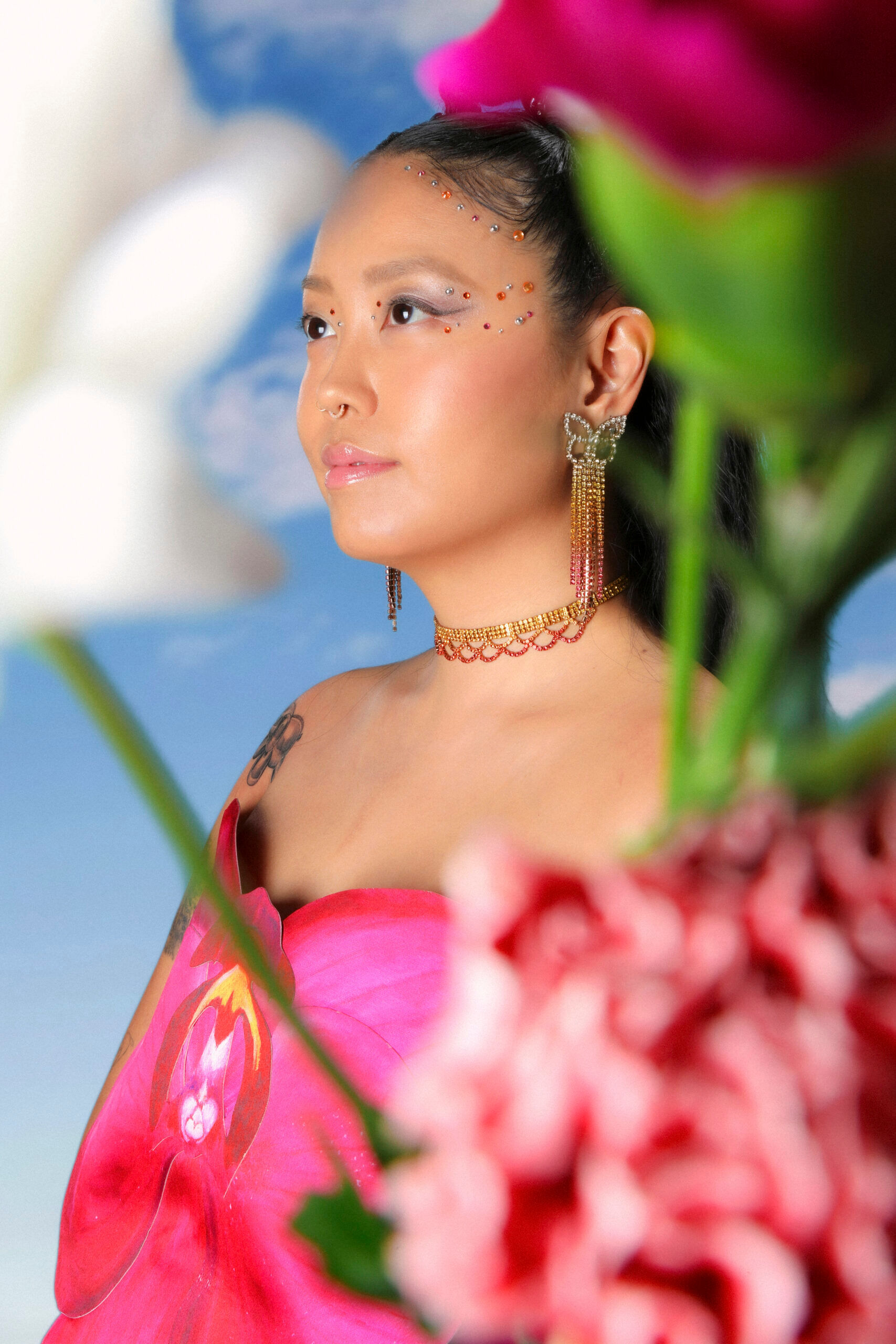*Photo credit: Brian Vu
Change is hard, nor is it linear. Artist, poet, and activist Jezz Chung (they/them) recognizes that, but they were still determined to lean into the discomfort that change brings to find growth on the side. From that determination blossomed their new book This Way to Change.
In September 2020, Chung quit their job in advertising to put their health and creative calling first. After experiencing years of burnout, Chung finally had time to reflect on the dreams they were fulfilling, the agency in the life they were living, the harm they might be perpetuating, and if they were truly enjoying their life. The desire to heal led them to study everything from race, gender, disability, power, and privilege to astrology, trauma, lifestyle design, and metaphysics.
From their studies came forth a collection of poems, prose, and practices to guide readers through personal change, while focusing on culture change. While their experiences as neurodivergent, queer, Korean American shape their work, their new book is a universal tool to guide others through their personal change. With that in mind, This Way to Change is a roadmap on the journey of self-healing, transformation, decolonization, and collective liberation.
Entertainment with an edge
Whether you’re into indie comics, groundbreaking music, or queer cinema, we’re here to keep you in the loop twice a week.
INTO chatted with Chung about their own personal transformation, the art that supported their journey, and what they learned about queer community along the way.

What three words would you use to describe your book This Way to Change?
✧ Future, healing, portal ✧
This Way to Change is emblematic of your own life changes. One change in particular was finding queer community for the first time. What was the process like and what did you learn along the way about queer community?
It can be hard to make friends as an adult! And not just to make new friends, but to sustain meaningful friendships. The logistical barriers alone, plus being in this state of polycrisis has heightened our social anxiety. It really does take courage and vulnerability to spend time with someone new. When I look at the throughlines, my deepest friendships have come through organizing and collective action. Building a foundation of friendship from shared values and this shared commitment towards something better is so fulfilling and special. It’s comforting to have friends who understand that what’s personal is political and what’s political is personal— as Audre Lorde has eloquently reminded us.
Speaking of change, what queer pop culture moment defined your childhood?
I wish I’d seen Alice Wu’s Saving Face when I was younger. An Asian American lesbian love story with intergenerational tension? It would have changed my world!!! I was so sheltered growing up, the pop culture I had access to were things like Veggie Tales and Disney musicals. To this day, I love musicals…which I think are inherently queer. At least one of those veggies is definitely queer.
Chinese American philosopher and community organizer Grace Lee Boggs’ words “transform ourselves to transform the world,” are the thesis for this book. What was the hardest part of your personal transformation?
Honestly, constantly practicing softness and compassion is the hardest part of healing. That’s why I call this book a gentle guide, because the world already works to harden us. There’s so much fear around us, so many harsh beliefs we have looping in our head. We live in a culture that profits off of us hating ourselves. Sometimes I feel like I have to be my harshest critic because it’s less scary to hear it from me than from someone else. So, I’m always beating myself up as a defense mechanism. I try to remember, changing yourself isn’t about becoming perfect. And it takes time. Being compassionate with where I am is part of my process, and something I’m still learning how to do without feeling guilty or ashamed.
Which film/tv show, song/album, book, or podcast do you keep returning to as you continue through your personal transformation?
Two of my most worn-in, repeat books are Audre Lorde’s collection of essays Sister Outsider and this book called Creative Visualization by Shakti Gawain. The first one I read when I’m angry, activated, and need some guidance from people who have felt these feelings before me. Lorde’s work articulates the cultural, historic, systemic roots to my emotions and helps me zoom out of my own experience. The second one is full of meditations, affirmations, and techniques to visualize your dream life. I read it when I feel like I’m stuck in a scarcity mindset or subconsciously limiting myself in some way. I also had this album by Fold called Aphelion: A Tribute to Lorraine Hansberry on repeat toward the end of the editing phase. Instrumental tracks with sound bites from Lorraine Hansberry mixed in, about using your voice, resisting fascism, transforming the world.
What was your favorite piece to write and what was the most difficult piece to write in This Way to Change?
Favorite would probably be LET LOVE BE LOUD, a poem in the third section of the book that I wrote after spending a sweet day at the park with friends. It was a poem born out of love and hope, a sense of bliss and satisfaction. It just felt good to write.
CONFESSIONS is a poem in the first section of the book and I wrote it as a practice of writing out things I’m afraid to say out loud, even to closest friends. I started writing it while taking a “Writing with Vulnerability” class from Fariha Róisín. I don’t remember what the prompt was but I wanted to push how honest I could be with myself, to give the confessions less power over me. I’m still afraid of reading it out loud.
What’s one misconception that people have about healing from systemic oppression?
That it has to be done immediately and perfectly. White supremacy, racism, misogyny, queerphobia, ableism, capitalism, these are all systems that have been in place for hundreds of years. Something that helps to reference is the “racial identity development model” (you can find visuals on Google). Just like healing isn’t linear, neither is change and growth. Sometimes it feels like we’re going backwards or like we’re doing so much for such little results. Collective liberation is a forever commitment, a lifelong practice. It’s a constant balance of resisting the current conditions while insisting on better conditions. Living in the world we have now while embodying the world we deserve to live in. It’s not easy and it’s not meant to be done in silo.
What do you hope readers ultimately takeaway from This Way to Change?
There’s a neurodivergent love language called “penguin pebbling” which is when you exchange tiny facts or gifts or gestures to show someone you care. I get so excited about learning and healing and dreaming and growing that I collected a bunch of pebbles and organized them into a book, including a resource guide at the end. It’s ADHD-friendly and full of stories and wisdom and life-changing information. I just hope that people receive my pebbles and they can be of use to them, wherever they are and whatever journey they’re on.

This Way to Change is out now.
Related:
Carlo Maghirang reimagines multiple generations of family with ‘MA-NA-NANG-GAL’
Visual artist and designer Carlo Maghirang is bringing Filipino myth making to life with his latest work ‘MA-NA-NANG-GAL.’
Here is the latest list of queer books conservatives really DON’T want you to read
The American Library Association says it saw a surge in requests to remove books in 2023 – with these titles causing the most fuss.
Don't forget to share:
Help make sure LGBTQ+ stories are being told...
We can't rely on mainstream media to tell our stories. That's why we don't lock our articles behind a paywall. Will you support our mission with a contribution today?
Cancel anytime · Proudly LGBTQ+ owned and operated
Read More in Get INTO It
The Latest on INTO
Subscribe to get a twice-weekly dose of queer news, updates, and insights from the INTO team.
in Your Inbox















